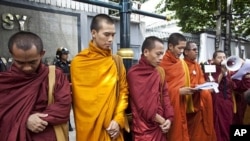Amnesty International says an imprisoned Burmese monk and a key leader in the country's 2007 anti-government protests known as the "Saffron Revolution," is seriously ill. Despite Burmese political reforms welcomed by rights groups and western nations, some 2,000 political prisoners remain behind bars.
U Gambira was the leader of the All Burma Monks' Alliance, a key group involved in the September 2007 uprising against the government. After organizing weeks of demonstrations, he escaped the government crackdown on the protests and went into hiding. He was arrested in November and has been in prison ever since.
Last month, there were rumors that he had been released along with nearly 200 other political prisoners as part of a broader amnesty. But U Gambira remains in Kale prison and Amnesty International says he is now seriously ill and is being denied adequate medical attention.
The London-based rights group quoted sources close to U Gambira as saying he has been suffering injuries from torture in April 2009, when he was reportedly shackled and beaten on the head with a stick. People who have visited him say he has scars around his eyes and has difficulty speaking.
Benjamin Zawacki, Burma researcher for Amnesty International, says the monk requires urgent medical attention.
"His health is deteriorating at a very very rapid rate," explained Zawacki. "He had no major preexisting health conditions, and his health at the current time is extremely alarming. A number of political prisoners have died in the custody of security forces and prison system and Myanmar and so that possibility can't be ruled out."
Amnesty says prison guards are treating him with sedatives instead of administering proper medical care. Researchers say one former prison official has appealed to government authorities for medical treatment.
October's prisoner amnesty included political prisoners such as the popular comedian Zarganar and political activist Su Su Nway, but international rights groups decried the releases as inadequate.
Amnesty’s Zawacki says the continued ill-treatment of U Gambira contrasts the recent economic and political reforms hailed as progress in the country.
In an interview with VOA's Burmese Service, Burma's Information Minister Kyaw San said authorities have already released 16,000 prisoners as part of mass amnesties. However he followed a longstanding government policy of refusing to acknowledge the existence of any political prisoners.
He says today there are prisoners in Burma, but they are there because they broke the law. That is why they are in prison. However, he says, among those prisoners there might be some who were involved in politics. He says the president is kind enough to consider them on a case-by-case basis and release them as he sees fit.
Burmese officials have launched a series of political and economic reforms aimed at improving their bid to chair the 10-member ASEAN bloc in 2014. This month ASEAN members are meeting in Bali and will decide on Burma’s bid. Winning the rotating chairmanship would give the government greater international legitimacy.
Imprisoned Burmese Uprising Leader Reported in Poor Health














